Inspire & Mentor with Marie Claire: The Mentors
To celebrate successful women achieving great things in Britain right now, Marie Claire launched Inspire & Mentor in association with the Prince's Trust in 2010. Get to grips with the success stories of our inspirational mentors here - and get ready to meet our 2011 mentors
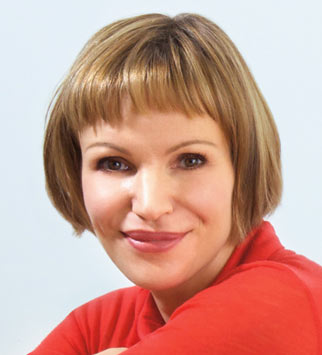
To celebrate successful women achieving great things in Britain right now, Marie Claire launched Inspire & Mentor in association with the Prince's Trust in 2010. Get to grips with the success stories of our inspirational mentors here - and get ready to meet our 2011 mentors
‘I left school at 17 with a handful of O levels and went to work as a production assistant on the first Sunday supplement at the News of the World. I didn’t think I could go into media, but I found myself working in media and publishing right at the beginning. From there, I went to work at Creative Review, the magazine for visual communication. My boss resigned after my first week there and I just stepped into her shoes!
I had always thought school was a big waste of time. I enjoyed geography and history, but I wasn’t really excited by very much else. My father died when I was seven, and that disrupted my learning a lot. My mum was Swiss and my dad was from Mauritius, so we didn’t have a large family around for support. I started working part-time in the local arts centre and at the local market when I was about 13 years old. So I’d spend up to 20 hours a week working. It all sounded so much more exciting than being at school.
I went to study PR and advertising at evening classes. I suppose I was trying to understand creative industries a bit better. I’ve always had a very strong sense of social issues and human rights, and I found it quite questionable how advertising and image work was being used to motivate people to buy stuff they really didn’t need or want. I thought it could so easily be used to promote social issues, or promote green issues.
I had always been very aware of social issues as my mother was a social worker and she was very passionate about Asians who’d fled from Uganda in the 70s. We’d go out and buy second hand furniture so we could help people settle in the town where we lived. She also supported people with disabilities and learning difficulties, and every Thursday we would have people over for tea. It was very interesting growing up thinking these people were not necessarily different, but that they had a very different perspective on life.
I wanted to see if I could run my own business and then apply what I had learned in the social sector. So I started running my own gorilla gram company for Valentine’s Day! It worked fabulously well and I broke even, so I realised that I could run a business. My boss at Creative Review, Chris Furey, both pushed me and let me get on with things while remaining supportive, which is what you need in a mentor.
Then I lived for a while in Tokyo – because I was learning Japanese – and I worked in the first Body Shop in Tokyo. I was inspired by people wanting to engage with the politics of it, which led me to start Global Village; a voluntary group and network, publishing information for people who supported and wanted to be active in green issues. Whether that was recycling, eating organic or volunteering for different groups.
Marie Claire Newsletter
Celebrity news, beauty, fashion advice, and fascinating features, delivered straight to your inbox!
In the second year of Global Village we started to import fair trade products, and we found that was the area we were really interested in; supporting producers and artisans through fair trade. It grew until we were running about 40 events every year and then had our own shops and stockists in Japan. People Tree was a part of that and for about eight years we had Global Village and People Tree running in our home. We had about 18 people in our house and it just became impossible to function! But it was really enjoyable. The living room, dining room and four bedrooms were turned into offices, while the garage became People Tree for our mail order business. I’d be putting the kids to bed at 9pm, and there would be five volunteers in the hallway guillotining leaflets to hand out the next day. The kids were even born in the house, with paper walls between whoever was in the office while I was giving birth! It was just madness.
Now, we have an executive board with some very high up people – one of them is Jane Shepardson who is now CEO of Whistles. Jane is someone I go to advice for an awful lot, and whose opinion and ideas I respect a great deal. She’s brilliant as she knows the fashion industry really well and helps me come up with some really exciting ideas. Fair trade requires you to think quite differently to how a usual fashion brand would work, so by getting together with someone who knows the fashion industry extremely well, you can come up with some ideas really work.
Safia Minney, 45, founder of Fair Trade and ethical clothing company People Tree
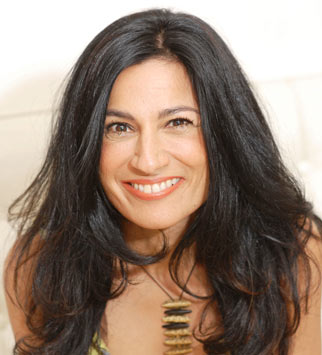
There are still some struggles with People Tree because there just isn’t the finance out there to support the expansion and development of fair trade businesses. But I didn’t have a Plan B when I started this! I know I’d work in social issues, but I don’t know how I ended up in media and fashion. If I wasn’t running a fashion company, I might be doing TV documentaries or journalism for alternative media.’
Marcia Kilgore, 41, founder of Bliss spa, and creator of Soap & Glory and FitFlops

‘When I was younger I wanted to be a backup singer for Ray Charles, but if that fell through, either a doctor or a lawyer. I had no idea that my biggest success would be a cellulite fighting FitFlop sandal!
I moved to New York when I was 18 with $300 and was surrounded by incredible people in an exciting place. My first job was as a personal trainer as it had low overheads; you only needed gym clothes and enthusiasm! New York is a completely energizing city, where there were successful people living out their dreams everywhere. I didn’t particularly look up to them, I just wanted to be one of them.
After spending two years jogging well-to-do New Yorkers around Central Park, I took a course in skincare and learned how to give facials. I was working 18hour days, juggling my one room facial place with my personal training clients. It’s difficult to say when I got my big break, as I couldn’t pinpoint one particular event. I don’t believe in luck; I believe in work, placing yourself in opportunity’s way and then taking advantage of it. It helped that I was young, wasn’t afraid of work and didn’t need much sleep! I was flat broke, working like a dog, and exhausted, but I wouldn’t change a minute of it.
Struggling made me more creative, but it also helped that my sister was a model and had all kinds of fashion connections, that she knew a stuntman who was also a massage therapist and he introduced me to a lot of his clients, or that Lori Goldstein – the world’s greatest fashion stylist – started coming for facials and ended up sending in Demi Moore, Uma Thurman, Calvin Klein and Annie Liebowitz. And maybe that Oprah came for facials and decided to put me on her show. All of these things were ‘breaks’ but I don’t believe you get a reputation through luck.
I came up with name for my spa while I was giving a treatment to a client. I thought about how I wanted people to feel when they came in, while they were having a treatment, and when they left, that it was more about the experience than anything else and encapsulating that in one word. It was: Bliss. The best advice I’ve ever been given is to take responsibility for every single thing that happens to you, rather than blaming it on bad luck, or fate, or someone else. Once you own everything that your life is, you have the steering wheel in your hands. It’s a difficult concept to grasp, but once you’ve got it, it’s particularly empowering. If you don’t achieve something, it’s because you are not ready for it, not properly prepared, or not in the right position to catch it. It’s nobody’s fault but your own.
I always say, ‘What’s the point in getting up in the morning to be average?’. I work harder than anyone else I know, but it’s also important to maintain a sense of humour and a good sense of perspective. I feel successful when I use my experience and knowledge to solve problems and when I remember that business is a game, and he/she who plays that game with the best product, and the most strategically envisioned effort behind it, wins. I feel successful when I see that one of my employees has learned something from me, or when I realise that I have learned something from them.
And I feel successful when I hear from people who love one of my products, how much it has helped them, how much they love it, and how they feel that buying something I’ve designed has been money well spent. Most of all, I feel successful in being able to remember that in the whole scheme of things, it’s business. And it’s not the most important thing in life; it’s about friends and family.’
Marcia Kilgore, 41, founder of Bliss spa, and creator of Soap & Glory and FitFlops

‘When I was younger I wanted to be a backup singer for Ray Charles, but if that fell through, either a doctor or a lawyer. I had no idea that my biggest success would be a cellulite fighting FitFlop sandal!
I moved to New York when I was 18 with $300 and was surrounded by incredible people in an exciting place. My first job was as a personal trainer as it had low overheads; you only needed gym clothes and enthusiasm! New York is a completely energizing city, where there were successful people living out their dreams everywhere. I didn’t particularly look up to them, I just wanted to be one of them.
After spending two years jogging well-to-do New Yorkers around Central Park, I took a course in skincare and learned how to give facials. I was working 18hour days, juggling my one room facial place with my personal training clients. It’s difficult to say when I got my big break, as I couldn’t pinpoint one particular event. I don’t believe in luck; I believe in work, placing yourself in opportunity’s way and then taking advantage of it. It helped that I was young, wasn’t afraid of work and didn’t need much sleep! I was flat broke, working like a dog, and exhausted, but I wouldn’t change a minute of it.
Struggling made me more creative, but it also helped that my sister was a model and had all kinds of fashion connections, that she knew a stuntman who was also a massage therapist and he introduced me to a lot of his clients, or that Lori Goldstein – the world’s greatest fashion stylist – started coming for facials and ended up sending in Demi Moore, Uma Thurman, Calvin Klein and Annie Liebowitz. And maybe that Oprah came for facials and decided to put me on her show. All of these things were ‘breaks’ but I don’t believe you get a reputation through luck.
I came up with name for my spa while I was giving a treatment to a client. I thought about how I wanted people to feel when they came in, while they were having a treatment, and when they left, that it was more about the experience than anything else and encapsulating that in one word. It was: Bliss. The best advice I’ve ever been given is to take responsibility for every single thing that happens to you, rather than blaming it on bad luck, or fate, or someone else. Once you own everything that your life is, you have the steering wheel in your hands. It’s a difficult concept to grasp, but once you’ve got it, it’s particularly empowering. If you don’t achieve something, it’s because you are not ready for it, not properly prepared, or not in the right position to catch it. It’s nobody’s fault but your own.
I always say, ‘What’s the point in getting up in the morning to be average?’. I work harder than anyone else I know, but it’s also important to maintain a sense of humour and a good sense of perspective. I feel successful when I use my experience and knowledge to solve problems and when I remember that business is a game, and he/she who plays that game with the best product, and the most strategically envisioned effort behind it, wins. I feel successful when I see that one of my employees has learned something from me, or when I realise that I have learned something from them.
And I feel successful when I hear from people who love one of my products, how much it has helped them, how much they love it, and how they feel that buying something I’ve designed has been money well spent. Most of all, I feel successful in being able to remember that in the whole scheme of things, it’s business. And it’s not the most important thing in life; it’s about friends and family.’
Liz Earle, 46, natural skincare expert
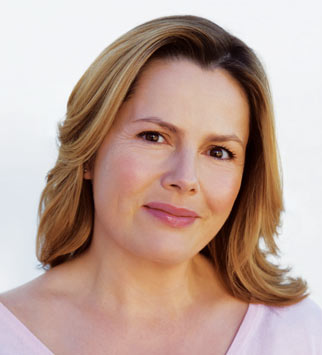
‘From a young age, I’ve enjoyed creating things from scratch and knew that whatever career path I followed would be very ‘hands-on’. My father is a keen plantsman and gave me my first love of botanicals. I remember going out in the early summer evenings and ‘picking supper’. My own journey in search of great skin began more than 30 years ago as a teenager with eczema. This, combined with my life-long fascination for botanicals and natural remedies, led to my early career as a magazine health and beauty editor. I went on to research and write several best-selling books on the therapeutic powers of herbs, plants, vitamins and essential oils, before co-founding the Liz Earle Naturally Active Skincare range – which is celebrating its 15th anniversary this year!
I worked with my business partner and friend, Kim Buckland, at Molton Brown in the 1980s. I was a specialist in botanical ingredients and Kim gained vast experience in the marketing of cosmetics. It was Kim who sensed a gap in the market for a skincare range with effective naturally active ingredients, which was fuss-free and affordable too. It was daunting, but we had so much experience between us, we felt confident to develop our own skincare range together. Since we founded the company, we’ve grown from a team of two to around 400! I think we both underestimated the huge amount of hard work it would take to make the company a success. We both had small children, so we would start work when they left for school, break mid-afternoon to collect them, cook dinner and then help with homework. When they were in bed, we’d restart our days and work late into the evening. In retrospect, I think we both feel we should have hired more support in the early days.
Our big break came when we appeared in the famed Millennium gold-cover edition of British Vogue in December 1999. Liz Earle Cleanse & Polish Hot Cloth Cleanser was featured on a page with the most iconic beauty products of the millennium, including global classics such as Chanel No5. The coverage set the phone ringing off the hook and we have literally never looked back. We now sell one Cleanse & Polish every 30 seconds in over 80 countries around the world, and it has won more than 40 industry awards and accolades. We’ve been described as Britain’s best-kept beauty secret… although I think the secret’s out!
My career has felt like a natural progression rather than a lifelong ambition. I don’t know what I would have done if my career hadn’t evolved the way it has because I feel I am on the path I should be – and feel very fortunate to have had such varied and exciting experiences, including a trip to Harvard Medical School to interview leading researchers on antioxidants. Being awarded an MBE by the Queen for services to the beauty industry was a wonderful moment, but Kim and I realise we could not have achieved them without our magnificent team on the Isle of Wight.
The best advice I’ve ever been given is crawl, walk, run – basically don’t rush anything and take your time to make sure that everything you do is right for everyone involved. One of my unofficial mentors has been Jo Fairley, the youngest-ever magazine editor and genius beauty writer. She once told me that making something tangible that can be enjoyed by others is one of the most rewarding things you can do – and she’s right. Kim has also been a mentor and inspiration to me throughout my career. Today, I’m inspired by mentoring members of my team who go on to achieve great personal success. We always try to operate by the motto, ‘lift others as you rise’.’
Marcia Kilgore, 41, founder of Bliss spa, and creator of Soap & Glory and FitFlops
‘When I was younger I wanted to be a backup singer for Ray Charles, but if that fell through, either a doctor or a lawyer. I had no idea that my biggest success would be a cellulite fighting FitFlop sandal!
I moved to New York when I was 18 with $300 and was surrounded by incredible people in an exciting place. My first job was as a personal trainer as it had low overheads; you only needed gym clothes and enthusiasm! New York is a completely energizing city, where there were successful people living out their dreams everywhere. I didn’t particularly look up to them, I just wanted to be one of them.
After spending two years jogging well-to-do New Yorkers around Central Park, I took a course in skincare and learned how to give facials. I was working 18hour days, juggling my one room facial place with my personal training clients. It’s difficult to say when I got my big break, as I couldn’t pinpoint one particular event. I don’t believe in luck; I believe in work, placing yourself in opportunity’s way and then taking advantage of it. It helped that I was young, wasn’t afraid of work and didn’t need much sleep! I was flat broke, working like a dog, and exhausted, but I wouldn’t change a minute of it.
Struggling made me more creative, but it also helped that my sister was a model and had all kinds of fashion connections, that she knew a stuntman who was also a massage therapist and he introduced me to a lot of his clients, or that Lori Goldstein – the world’s greatest fashion stylist – started coming for facials and ended up sending in Demi Moore, Uma Thurman, Calvin Klein and Annie Liebowitz. And maybe that Oprah came for facials and decided to put me on her show. All of these things were ‘breaks’ but I don’t believe you get a reputation through luck.
I came up with name for my spa while I was giving a treatment to a client. I thought about how I wanted people to feel when they came in, while they were having a treatment, and when they left, that it was more about the experience than anything else and encapsulating that in one word. It was: Bliss. The best advice I’ve ever been given is to take responsibility for every single thing that happens to you, rather than blaming it on bad luck, or fate, or someone else. Once you own everything that your life is, you have the steering wheel in your hands. It’s a difficult concept to grasp, but once you’ve got it, it’s particularly empowering. If you don’t achieve something, it’s because you are not ready for it, not properly prepared, or not in the right position to catch it. It’s nobody’s fault but your own.
I always say, ‘What’s the point in getting up in the morning to be average?’. I work harder than anyone else I know, but it’s also important to maintain a sense of humour and a good sense of perspective. I feel successful when I use my experience and knowledge to solve problems and when I remember that business is a game, and he/she who plays that game with the best product, and the most strategically envisioned effort behind it, wins. I feel successful when I see that one of my employees has learned something from me, or when I realise that I have learned something from them.
And I feel successful when I hear from people who love one of my products, how much it has helped them, how much they love it, and how they feel that buying something I’ve designed has been money well spent. Most of all, I feel successful in being able to remember that in the whole scheme of things, it’s business. And it’s not the most important thing in life; it’s about friends and family.’
Sarah Walter, 45, director of fashion communication at River Island
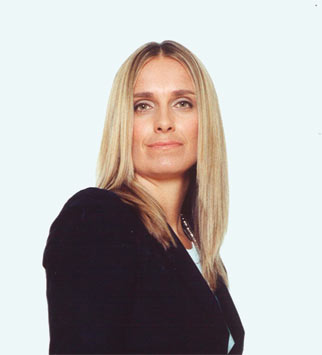
‘My career has been in two parts – the magazine part and the retail part. I had a work experience placement at Vogue when I was at St Martin’s College and I started the same day as Anna Wintour! I became a fashion assistant and then I was promoted to accessories editor. It was all quite shocking because I was only about 22. It was because of Anna Wintour. She changed things; it wasn’t about having been there for 27 years and jumped through 3,000 hoops. I was about whether she thought you could do it.
But I really grafted, seriously. I worked very hard, very late and I didn’t have a holiday for about three years. My father’s probably a workaholic and my parents raised me to believe if I put my mind to something I can do anything. I think success is a combination of believing in yourself and working hard.
I was at Vogue for about four and half years and then I resigned because I wanted to travel. I’d worked and worked, and just felt something was missing. I then became fashion director at Marie Claire, but I left magazines for good when my second daughter was born with no left hip socket. She needed lots of big operations when she was very small, and I knew I wouldn’t be able to flit around the world when I had a small baby either in hospital or in a plaster cast. But resigning wasn’t difficult because she was more important.
I’d been doing some work for New Look as a consultant, and then they offered me a full time job. The key to my success there was being broadminded – magazine fashion can be quite rarefied; the best models, designer clothes. But magazines weren’t as focused as they could be on the consumer. In retail, things you think are hideous as a fashion editor might make tons of money because the customer loves it. I thought it was great – I was learning about business and giving people what they wanted.
New Look was very exciting because it was the shop nobody had really heard of, but it was getting bigger and bigger. I had this idea that everybody is entitled to good design, not just fashionistas and no matter what the price. I was responsible for all the celeb tie-ins, such as Kelly Brook and Lily Allen. Lily was so popular on MySpace and I loved the way she wasn’t a skinny Minnie. She was all about dresses with baseball boots – she had that very specific style in the beginning – and we sold a zillion dresses. At the same time, we’d been talking to Giles Deacon, a very talented young British designer. They all worked incredibly hard with an enormous company who could do things for them and vice versa.
I was at New Look seven or eight years, starting as a consultant and working up to head of Fashion Communications. I changed the way people perceived the brand and then moved to River Island. RI design is incredibly focused – they really know their customer – and their stores are so slick. About 60% of the designers we use are graduates fresh out of fashion college. I’ve been there for two years now. They have a lot of women in senior positions, which is very appealing as it is quite a male dominated industry at the top end. Women do things in a different way and I think women understand how women work.
I’ve had work wobbles, a couple of work relationships that haven’t gone so well. But you need to know how to make that work, which is just by being professional. Even if you don’t get on with someone, you can always be professional to them. My advice to anyone wanting to make it is not to worry about the things you have no control of. Lots of people waste a huge amount of time worrying about things they can’t change. If you worry about things you cannot affect, it’s a waste of energy and it exhausts you.’
Kelly Hoppen, 50, interior designer
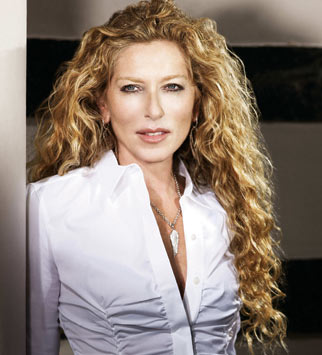
‘When I was little, my mother and I used to go and look at showflats at the weekends. I just loved looking at the before and after pictures. I started my business when I was about 16 and half – my stepfather had a friend that wanted his kitchen doing so I did that. When I was 17, one of my girlfriends was having an affair with a famous racing driver and I was given the job of doing up his house! I had a stream of celebrity clients from a really young age; that’s really how my career took off. It was all word of mouth, so I was fortunate that my friend was sleeping with a celeb!
I did have enormous drive. My father had just died and I guess I didn’t want to rely on anybody. I thought, ‘I’m going to do this on my own’, and I did. I was completely self-taught in terms of business and money management, everything like that. In many ways, his death made me the successful woman I am today. It drove me to feel like I shouldn’t ever have to rely on somebody. I still work incredibly hard. I sit here sometimes listening to all my staff telling me about the holidays they’re going on, and I think, ‘I haven’t even booked one myself’. Particularly in a recession, you’re constantly on it; success is not a day job – that’s my motto.
My mother was a very successful businesswoman and, in a way, she was my mentor. She worked incredibly hard and I think it’s great for children to see their parents working, even if they have money; they’re still out there, they’re ambitious, they’re focussed, they’re passionate. My mother was all of those things, but she always stopped at teatime to pick me up from school. Because she was a barrister by profession, she was always very level headed. Whenever I’ve needed advice in my career, I know I can ring her and she’ll tell me the truth. Many people will tell you what they think you want to hear, but she will always tell me as it is.
I still get stressed, as it’s much more stressful to work for yourself. If you work for someone else, you can go home if you get sick and not worry about how the business is run. I worry constantly about how everything is run in my business. Getting my MBE from the Queen last year was a definite highlight, but I’m always striving for the next thing. Entrepreneurs are always striving to look at things outside the box, from left to right, from up above, from underneath – nothing’s too big but nothing’s ever big enough.
I now have a design school and that’s a really good thing. People are so thankful that I’m giving back and teaching. We have a lot of youths wanting to start up their own businesses and I say to them, ‘Anything is possible, you have to believe in it. You have to visualise your future, learn from your past, and make these things happen’. As long as you’re positive, you can visualise what you want and you have a passion and a focus, anything is possible.’
Julie McManus, 38, head of scientific and technical regulatory affairs for L'Oréal
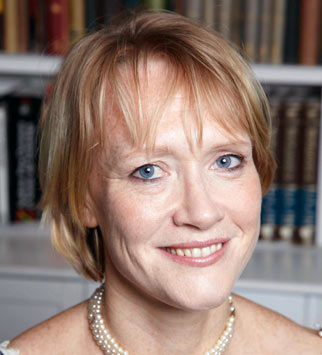
‘I arrived at secondary school contemplating going into medicine, but I just missed the grade on my chemistry A level. I considered retaking the exam, but I wasn’t 100% sure I wanted to go into medicine anyway. So, I decided to do biochemistry, as that’s the basis of medicine.
In my final year at university, I was offered a job with Proctor & Gamble and it sounded really interesting. I really like the application of science and the fact you can see results quickly. I found the whole area of cosmetics really fascinating, but I also love understanding what motivates people. So I was also working on a lot of consumer research, travelling around the world. It was brilliant!
I left after about five years to go to L’Oréal. I had always looked towards working for them as they are constantly changing and coming up with new ideas. I started working for them in Paris; I had flat with a view of the Eiffel Tower and I was learning to speak French. Honestly, I thought I was in paradise! I now work across everything, from hair to skincare, from aerosols to make-up, hair straighteners and hair colour. It’s immense and I find that really stimulating. I learn something new at work every day.
We also do a lot of advanced research, where amazing scientists work on groundbreaking studies that are published in scientific journals. I love that, as it proves I didn’t just walk away from science. I may not be working on cures for whooping cough, but I’m working in some very important areas, such as sun protection. I consider myself very lucky. I think it’s a shame so many people on my biochemistry course left and went onto something completely different because they didn’t know what jobs were out there. There is a real lack of information about the wide spectrum of jobs that are available to you if you are a scientist.
I think there is a need of visible role models in science. That was probably the main reason I left my previous job, because there was no one inspirational there, no one I aspired to be. I’m always looking for the person who’s ‘glowing’ about science. We’re always looking for someone who makes us feel good about being in a subject area and makes us interested in that subject. When I got to L’Oréal, I did find someone incredibly inspiring. Vick Hide was my mentor and he’d worked in the industry for years. He made sure I worked on things that would help me grow and develop, and he became a friend too.
I love understanding things. I love understanding genetics and why diseases occur; the basis for the what, why and when. That really motivates me; the feeling that I’m learning something new, but also understanding things. I’m one of the most analytical people I know. I pick everything to pieces to understand exactly why something has happened or why it’s happening. It’s no surprise I’ve ended up in this field! It is really important to love the subject you’re working on and to learn something new every day.’
Kanya King, 39, founder of the MOBO Awards
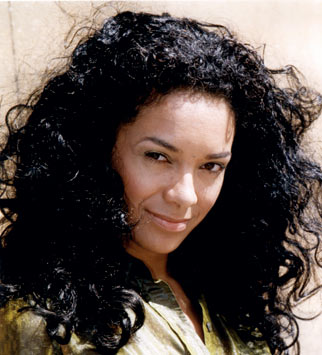
‘It’s the 15th anniversary of the MOBOs this year, so there’s many big things happening. It’s going to be a real major event – last year exceeded our own expectations, which is fantastic. I had no idea I’d end up doing this kind of thing. I was the youngest of nine children, so in many ways I was inspired by my parents. My mum came from a village in Ireland and my father was from Ghana. He died when I was 13 from a form of leukaemia, but I got say goodbye to him the night he died. I had just been to see him at the hospital, but I rushed back to the ward and he smiled at me and said, ‘Be the best that you can be’. That has stuck with me, particularly when I have any challenging moments.
From a young age I was used to being in a supportive role, particularly if there were bills to be paid. I had a bank account very early on and I got a lot of pleasure from my own savings. So I got used to being quite independent – if you wanted something, you got off your bum and had to work for it. We didn’t grow up in a tough area, but we did have to buy our clothes from jumbles sales. It’s called vintage now, isn’t it?! But in life, I think it’s not where you come from that’s important, it’s where you going to. My childhood gave me the determination to prepare to make sacrifices to do what I have my heart set on. Being entrepreneurial means you need to work hard 24/7, be focused, have vision, self-belief, clear goals, and aspire to greater things.
Because my parents were in a mixed-race relationship, I grew up listening to lots of different types of music. I had lots of different friends from different backgrounds and I got to explore in a very urban culture. My older brothers and sisters started taking me to clubs when was I was 11 or 12, so my musical education started quite early. I went to see the careers adviser at school and explain my ambition and vision of what I wanted to do. The response was ‘Well, if you work hard enough, you might become manager at Sainsbury’s’! I became a single mum at 16 and left school with only a few GCSEs, but I was always into music.
The idea for the MOBOs came about as the musical landscape was changing. I recognised that there was a huge gap in the market and there was an audience out there that wasn’t being catered for. I wanted to do something about it, so really I was really organising live music events from a young age. I had been organising events locally, but the amount of people who turned up to one at the Hippodrome was incredible. (CHECK) I didn’t have any money for advertising, so my marketing was through word of mouth. Lots of celebrities turned up too, which is when I thought of the idea of creating the awards as a showcase, a platform for the artists who didn’t quite get the recognition they deserved. I started the business in my bedroom! I’d still be in my PJs, picking up the phone and saying ‘MOBO Organisation’! I was fortunate to have friends help me out at the beginning, but obviously they’re not going to have the same drive or commitment you have.
I think every entrepreneur makes mistakes, but the key thing is to learn from it. If you’re continuing to make the same mistakes then there’s something wrong. One major mistake I made was not keeping an eye on the financial bottom line. I had an accountant and ended up getting kind of ripped off. So, of course, now I keep a close eye on the bottom line! I do work long hours, but because I’m passionate about what I do, I’m prepared to put in the time. When I really want to get something done, I’m quite focused. You need to have perseverance and aspire to greater things if you want start up your own business. If you do whatever it takes, however long it takes, and refuse to quit. Success is only a matter of time. I’ve always felt that I haven’t got to where I am today because of any extraordinary talent, it’s because I refused to quit!
The downside is learning to switch off, but you do have a choice. You can make yourself happy or unhappy and you can choose what you want it to be. I always think yesterday’s gone and tomorrow hasn’t arrived yet, so you’ve got one day and you’re going to be happy in it. I feel you should work for what you want, whilst being happy with what you have. I try to live by that; being grateful for what I have whilst working towards what I want.’
Jo Malone, 47, perfume and scented candle guru
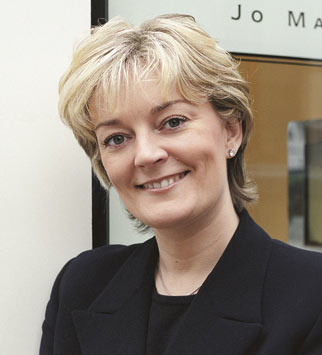
‘I left school when I was about 13 and went to work in a florist. My mum was really ill and I had to look after her, so I’ve got no GCSEs, no CSEs, nothing. We lived on a council estate with no money, but we kind of muddled through. There are stories that I used to make my perfume from flowers in the garden, but it wasn’t some idyllic country cottage in Kent. It was a council estate, two-up-two-down, and we struggled. I had a very happy childhood but it was a tough existence.
My mum was a facialist, but I took over her clients. I figured out how to make face creams and I’d get on the train to London and sell them. I didn’t get into fragrance until I was much older. I was having to put food on the table, to make sure the bills were paid and the house was run while my sister was at school. But if I had my time again, I’d still do it the same way. If my life had been different, I wouldn’t have had the drive, determination or the hunger to succeed.
I’ve had a lot of ‘lightbulb’ moments with my business. One of them was creating my first fragrance, without any training or teaching. Everybody that smelled it wanted to buy it and I knew I’d done something incredibly successful. I put it into a body cream that I’d made – it was nutmeg and ginger – and it did smell amazing! Everybody in life wants to find the thing they’re really good at, whether that’s painting, art, being a musician. I couldn’t do any of those things, plus I have dyslexia which did put me at a slight disadvantage. But with that fragrance I thought ‘I’ve found my thing. I’ve found my happy’.
Another lightbulb moment was when my husband Gary and I opened our shop in Walton Street. It was really scary because we knew we could survive for a year, but after that we would go bust. Everyone told me I was mad, I’d never be able to sell the product and it was terrible idea. But we opened in October and in the December I looked up and the place was heaving. There were people standing outside queuing all the way down the street to get in. You feel utterly blessed at that moment to think, ‘Here we are sitting on something’. But it was still incredibly hard work!
When the chips are down, there’s something within me that rises and thinks, ‘There has to be a way. We’ve just got to find it’. I remember my bank manager refusing me a #100 overdraft to by sheets for my clinic bed in the beginning, but I sold a ring for #60 to get me through. I’ve had hundreds of setbacks, but you don’t get to the places I’ve been to in my life without taking chances. My gut instinct is my best friend and it told me to go for it. I wouldn’t be sitting here now if things had gone the other way.
I’m now mentoring entrepreneurs for a BBC programme to find the next great British brand. It has been one of the greatest challenges of my life and the greatest reward. I’ve never done anything where I have found so much enjoyment from helping other people. I think entrepreneurs think in a different way to others. I’m always looking for the solution, trying to find the way, or a different way through. I’m very dyslexic as well, so dyslexics always have to find solutions very quickly because they’re always playing catch up with themselves. I’m never frightened of saying, “I’m really sorry, I don’t know what that word means”. There’s no shame in saying you don’t know how to do something. I think a huge part of my success has been the ability to ask for help when I needed it.
I’m inspired by anyone that gives it a go, that wonderful aspirational quality of somebody saying, ‘I’m going to give this a try’. If I’m around people like that, I just come alive. I believe all things are possible for those who believe – I’ve got that motto on a cushion on my bed! I’ve had that since I beat cancer five years ago. I feel most successful when I’ve achieved something someone says I can’t do, when you prove something against the odds. Or the fact I have created something that is loved, also brings me the most unbelievable feeling of fulfilment.’
Elizabeth Karlsen, 49, film producer and chairperson of Birds Eye View
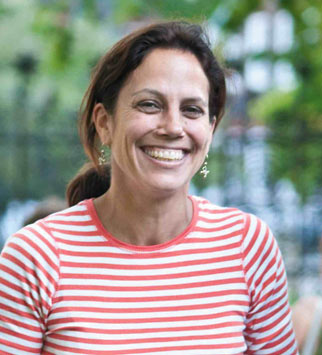
Claudine Collins, 41, head of investment for MediaCom
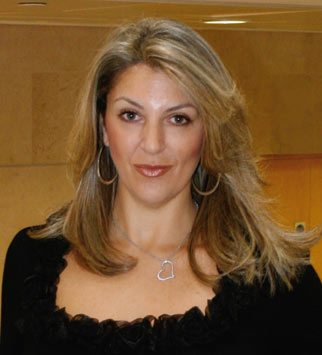
‘We are a media buying agency, with about 200 clients who use us to plan and buy their media campaigns. My particular job is looking after the investment side of things. My team buy about £1billion-worth of advertising space, whether that’s in TV, online, or press.
I didn’t know I wanted to do this job at all. At school, I decided to be a lawyer because it seemed glamorous, but when I started looking at university courses, I realised it wasn’t something I was interested in. I looked into advertising and discovered that if you’re good with people, numbers and lots of other areas that seemed to suit my personality, then it could be a great career.
I have been at three big agencies and small independent companies with a few clients. I started in the early 1990s when people would take clients to the pub for lunch and never come back! The business is nothing like that now. I was soon headhunted by a big agency and my boss really encouraged me to go for it, even though he didn’t want to lose me.
If you want to be promoted, you need to genuinely care about your company and your clients. You can have as much training as you like, but you have to have passion inside you to want to succeed for your clients, your boss and yourself. Your job can’t just be a means to an end – if you see it like that, that’s what it will be.
I’ve got a very hard work ethic; I push myself and I want to succeed. That’s my choice and I’m not saying everyone has to be like that, but I’ve always worked long hours. I’m not naturally clever so even at school I had to work very hard for everything.
You need experience, understanding and patience to be a mentor. I’ve seen people I’ve worked with being written off by others because of a couple of mistakes. But I’ve seen something in them; perhaps they just needed better direction or to be dealt with in the right way. They’ve ended up being hugely successful and that’s given me such a rush.
I’ve always had people in the agency who’ve helped me see more clearly and I want to do the same for others. I’m tough – I don’t suffer fools gladly and I’m very straight – but I’m always happy to help people. It helps to remember you can only do your best. For years, I never thought that, but when you’re really stressed and under pressure, it helps to think that to yourself.’
Dawn Airey, 49, chair and chief executive officer of Channel 5
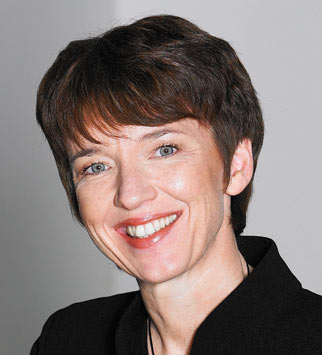
‘I always wanted to go into journalism, either print or television. I wanted to tell stories and I knew I wanted it to be news and current affairs. I never set out to be the Chief executive or chair of a company, but I want to do the best I can, because why wouldn’t you?
I studied geography at university and then went straight to Central Television (CTV). I had a couple of interviews for the BBC training course, but I didn’t get on. To be honest, I had been a little bit blinkered; I was very confident I was going to get into the BBC and I hadn’t applied for anything else. But I contacted all the ITV companies and was one of three trainees chosen for the CTV scheme. It taught me that if at first you don’t succeed, try try try again!
My mentor was the most wonderful guy called Andy Allen – very good instincts and one of the funniest men alive. I learnt an awful lot from him. My aim was to be a controller by the time I was 30, but I’d done it by the age of 26. I then moved to ITV and was the first controller of kids’ and daytime TV. There was a high degree of scepticism around my appointment, particularly because I hadn’t made any kids or daytime programming. But one thing I did know was audiences and how to construct schedules.
One of the highlights of my time at ITV was introducing Dale Winton to the world in Supermarket Sweep! Because I’d done such a good job at ITV, I was noticed by Channel 4 and I moved across to be controller of arts and entertainment. I was then approached by Five, who were just about to launch and were trying to do something different. They were very commercial and I became their first director of programmes. No one had done this job before but I’m a thrill seeker. I like challenges!
I left Five and went to Sky, and then on to ITV, but ended up back at Five. I didn’t want to leave ITV, but I cared about Five more than I cared about anything else. Leaving ITV was the hardest, bravest and most difficult thing, from a career perspective, I’ve ever done. I think I deal with criticism because I have a sort of inner strength, an inner confidence. I think that’s how I earned my nickname ‘Scary Airey’! I know what I’m good at and I know my comfort zones, but I’m not afraid of doing things other people wouldn’t do – it’s part of my DNA! When something’s running really well, it’s time for me to move on because it means I’ve done my job.
You need a sense of perspective in this job, because television doesn’t really matter. It’s about entertaining and informing people; it’s not life and death! I’ve got a lot of other things in my life that are important. I have a young daughter and my partner, Jackie, is pregnant again so there’s another one on the way. I still work long hours, but a lot less than I used to. I get the cold shoulder if she doesn’t see me for a couple of nights on the trot, so I make more of an effort to come home and see her.
If you want to work in this industry, you need enthusiasm, a willingness to do anything and work really hard. You’ve also got to be good at what you do, and it really helps if you’ve got a mentor. People in telly are very willing to give advice, so make your contacts! And the one rule I live by is always treat others how you expect to be treated, irrespective of what your role in the company is.’
Kate Bostock, 52, executive director for clothing at Marks & Spencer
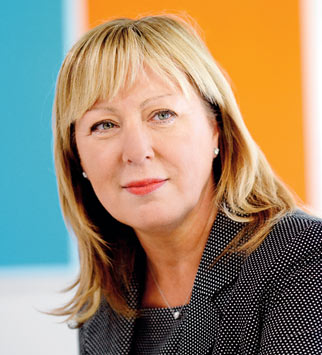
'When I was younger I was very driven and always knew that I wanted to be in fashion. I used to spend all my time making outfits for my dolls and my mum, who was in textiles and made my clothes. We’d work on the designs together and she was very inspirational and supportive.
My dad was also in the industry – he ran a textile mill – and so he too was very encouraging. For them, and me, working at Marks & Spencer was always the dream. In terms of manufacturing, they were the Rolls Royce of the industry and so to work there now and and be a leader in womenswear feels really amazing.
I started out on the design team of a mail-order company. At that age I wanted to be the next Mary Quant, or Vivienne Westwood, and used to spend all my time reading about them. We made knitwear and jerseywear, which I loved, so it was some years later that I got into the buying and business side of things.
Moving from the North of the country to London, I took on roles at NEXT and George for ASDA when the brands were somewhat struggling, but for me the challenges were exciting rather than scary. A promotion to Product Director at George saw me heading up all product areas, from womenswear and menswear, to footwear and lingerie. This eventually lead to my current position at M&S, which I took on in 2004.
Barely a week after I got the job at M&S, the executive chairman left, to be replaced by Stuart Rose. I remember feeling terrible about the fact that I wasn’t his recruit and he hadn’t appointed me, so we spoke over the phone and I insisted he re-interviewed me! I didn’t want to feel like he’d just inherited me – he knew a lot of people, especially based in London – and I wanted to be sure that we were going to work well together. I think he found it pretty amusing and in the end he was even a bit irritated but he did re-interview me and it turned out we’re actually very in tune in terms of what we want for the company.
I often spend my free time in the evenings and weekends wandering around Marks & Spencer stores, just watching what people are buying. Everything is so closely linked in fashion, I just like to see the customers shopping with my own eyes.
Being a good mentor means having confidence and really listening to what a person needs. Drawing from your own experiences can really go a long way – and not necessarily just your good ones.
I always strive to push people out of their comfort zones, and encourage them to take on challenges and make changes within their life. People get comfortable too easily, and a mentor should recognise when they’re capable of more. I like to think I have spotted a few stars along the way, and that they have learnt something useful from me.’
Sally Greene, 47, owner and chief executive of the Old Vic Theatre
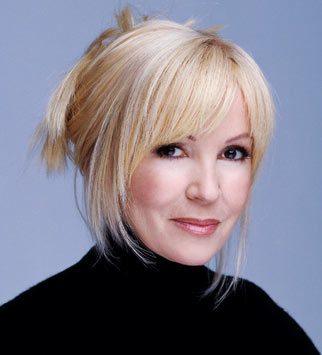
‘I started out in this business 20 years ago. My father was a trustee on a number of theatres including The Richmond. It had fallen into disrepair and he said it required someone of energy and dynamism to bring it back to life, and he thought of me! I still had to pay a large sum for it and then set about its painstaking restoration. It was here that my love affair with theatre deepened. To this day, if you look at the very top of the Richmond ceiling, written into the plaster is 'sally woz here'!
When I began my career, I was a woman in a male dominated business, so was referred to as ‘the girl’ by many of the producers I dealt with. This was a great incentive to me to get it right. In the last five or ten years, there’s been a huge shift in both the theatre and film business, and now it is increasingly female dominated. My big break came when I was walking down a street in Waterloo and saw the iconic Old Vic Theatre looking sad and dejected. Having rescued and restored the beautiful Criterion Theatre in the West End, I knew I couldn’t let such an important venue disintegrate. I felt a kind of responsibility to help save it – so I formed a charitable trust to raise finance, as well as injecting a pretty large sum of my own money.
Then, in 1999 I saw one of the great theatrical performances of the last decade: Kevin Spacey in ‘The Iceman Cometh’ at the Almedia Theatre. I just had an instinctive sense that here was a man of great passion, tenacity and skill, who could lead a theatre company and run a building for the new millennium. And the rest, as they say, is history.
When you’re producing your first show – you have huge butterflies about what is at stake and the finances involved. I don’t think this ever really changes but the numbers get bigger! Every day I think I’ve blown it, but the that’s the nature of the beast. You can have a project that looks fool proof on paper, is well cast and well written but just doesn’t have that magical quality when fully realised. There is always an element of luck involved in the arts.
Lord Attenborough was a mentor to me. I met him at a dinner and I thought this man was incredible. He loved life, his work, his wife, and he is the most passionate man – hugely committed to creating great art. He taught me many things, both directly and indirectly, but I suppose his greatest lesson was to never give up and to keep plugging away for a creative project you believe in. I also have enormous love and respect for Stephen Daldry – he has an exceptional gift as a director and he is someone whose taste and judgement I trust implicitly.
I have a photo in my office where a huge bird is swallowing a very small bird, but the small bird’s tail feathers are still visible. The caption is “Never Ever Give up”. I had an extreme health issue a few years ago. It was the only time in my life when I have struggled to get out of bed. When you have faced that, nothing intimidates you.
I feel successful when I see an audience spontaneously laughing and enjoying moments together. I watch the show from all areas of the auditorium – both to check that sightlines are good but also to feel whether the vibe from the stage dips in any areas of the house. You need to know that your audience is getting the best possible experience they can from a show, even if they are in the least expensive seats. I try never to shout and lose control. It is a weak person's way of getting what they want. Gentle persuasion is the best. And the best advice I’ve ever been given is to always know when to take the show off.’
Ginny Lunn, 45, director of policy and development, The Prince's Trust
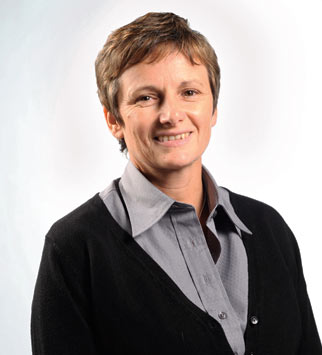
'I was the captain of my primary school football team at the age of about nine or 10, and it was the first time I thought, ‘Ah, leading a team is quite good!’ I think I’ve always wanted a leadership role, doing things that were a bit different and taking on responsibility. I started out as a primary school teacher, but I was also interested in other forms of education so I looked into different types of schooling.
I was then offered a job in Dublin for a programme called Youth Reach, which was for young people excluded from school. I think that’s where I found what I’m really interested in. These young people have really struggled, so what is it that’s going to inspire and motivate them to stay in education? I was attracted to the work because of my own experience – I was very naughty when I was at school and nearly expelled twice! I missed lessons and once led a group of other kids out onto the roof…
For me, what’s really important is finding out what really motivates young people and what’s going to help them succeed. It’s fine if you don’t have an idea of what you want to be, but I think it’s about having lots of experiences, so you discover what’s going to motivate you. With the team I work with at the Prince’s Trust, I have lots of young people who volunteer from very different backgrounds, all looking for what it is they’re going to do.
I’ve never felt daunted by my work because I’ve always been part of a team who may have a specialism that I don’t. I think it’s also about being honest – if you don’t have a particular experience, you need to be honest about it but know where to find it. It’s part of that culture that it’s OK to fail at things, because that’s how you learn.
I’m a big believer in living life and really grabbing experiences. I’ve always worked hard, but I’ve had lots of other things in my life as well. I’ve always been interested in how the world is, and what you can do to make certain aspects better. I’m not being grand and thinking I can change the world, but doing those little bits is a rewarding thing.
A family friend once said to me, “Only 2% of the population enjoy their work. Make sure you’re one of that 2%”, I didn’t know if that was true but a lot of people I talk to don’t enjoy their job. So I think it is important to find the one thing you really enjoy, because you spend so much time doing it.’
Joanna Shields, 47, former chief executive of Bebo and co-founder of a new venture integrating TV with social media, most recently made vice-president of sales and business development at Facebook
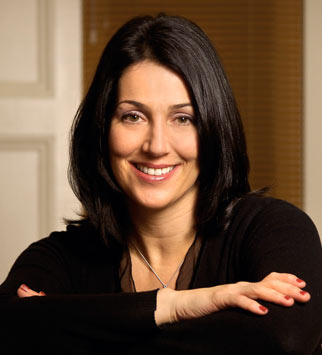
‘Coming up through the tech industry, there weren’t a lot of women. I remember trying to break into certain aspects of the business, and people going, ‘A woman flying to Japan to do billion dollar deals? Yeah, that’s going to happen’. So having it happen was quite spectacular! But things have changed a lot in the last 25 years. It’s dramatically different now.
There are more women in the industry, but they check out of it and many don’t come back, which is unfortunate. It’s really hard when you have children, you step off the treadmill and it’s difficult when you try to get back on. It was hard when I had my son, but I was a single mum, so I didn’t really have a choice! I used to take him and a nanny to work with me all over the world, because I didn’t want to tell my boss I didn’t have my shit together. By the time he was three, his passport was full!
I’ve always been quite business-minded. I got my first job in a jewellery store when I was 13. I just wanted to make some extra money and I had five brothers and sisters, so I wanted that independence. My father’s an entrepreneur, so I also had a good role model. He always said, “You’ve got to get out there, got to get into a good university and you’ve got to make something of yourself”.
I was lucky that I was working on the edge of the industry, so I was always building new products and new initiatives. My history follows the whole analogue to digital, digital becoming the internet, and then the internet becoming what it is today. I’ve kind of seen technology through all those stages. The internet used be something techies used for sharing information, but when the web took off and people started to understand the potential of it, I wanted to get involved.
I went to Google and built their advertising and syndication network across Europe, Russia, Middle East and Africa. And just as I was really enjoying myself there, this whole social networking thing started happening and I was asked to become the chief executive of Bebo.
I believe that even if you get your dream job, you can’t stop there. You have to be current, you can’t stop reading or finding out what’s going on in the industry. You have to look for those opportunities and you have to be willing to put in the time. I think the people that do that, who are constantly thinking, tend to be more successful.
I’m a very inclusive manager. I’m famous for running around the building, pulling people in to team meetings and asking them what they think! If I’ve overheard a conversation, I think these people may have something to say. Certain levels of management wrestle with that, as it upsets the structure. But that’s how you stumble on opportunities. It’s like the physics theory of kinetic energy, when something bangs into something else and the energy is multiplied. To me, that’s quite exciting.
When I hire somebody, it will be with a role in mind. But if I notice they have different skills, I say, ‘Why don’t you do a little bit of this?’. It’s about finding the best in each person. Often the direction I actually push that person into turns out to be what they really love to do. People are not puzzle pieces – every individual is different, so you need to work out how they fit and how to get the best from everyone.’
Michelle Mone, 38, founder of Ultimo lingerie
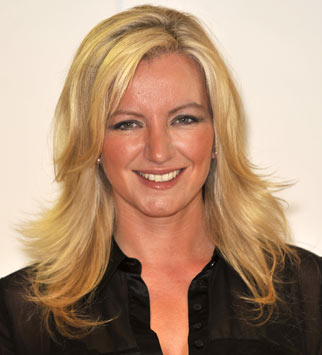
‘I was made redundant when I was 24 and was a bit depressed, but then I realised I had to pick myself and be positive because no one else would give me anything. I had the idea for Ultimo after I went to a dinner-dance. I was wearing a very uncomfortable cleavage bra and thought, ‘Why should women go through this pain for a small bit of gain’? I spent three years inventing a better version and we launched the brand 10 years ago. It’s now the biggest brand in the country; it’s an empire!
When we first launched the business, I put my house up for security with the bank to finance it. I re-mortgaged my house three times; fear every single minute of the day. I don’t thrive on that, it was just awful! But I absolutely love being in business. I always set my goals and as soon as I achieve them, I set myself new goals, so I never ever stop. I’m a bit of a nightmare – I get four hours sleep a night because my mind just will not stop. This year we’re launching Ultimo dresses – couture dresses for the high street, Ultimo perfume and Ultimo beauty, so we’re taking the brand to another level. It’s those things that I am passionate about. Business is sort of addictive; it’s my life.
One of the defining moments for the brand was when Julia Roberts wore our plunge bra in Erin Brockovich. Now lots of big stars like Cheryl Cole wear Ultimo – it’s really flattering. But we really specialise in the design of that bra; we’ve got a team of 25 technical designers whose job, all year, is to make that bra fit better. I believe that you should keep innovating. We’ve got two inventions coming out this year, one of which is probably our best yet. It’s bra for everyday wear and what it does for you is unbelievable. It’s basically the lightest bra in the world.
I had my children in my 20s, before we launched the business. But I also set targets for my family! I have peak performance indicators. I’ve got them in my business, and my business runs really well. I thought, ‘Why is my family life, my home, in chaos?’ and it’s because they need direction. They have that direction now with the PPIs. We have charts and timetables and everyone marks each other, so the gardener marks the housekeeper and vice versa. They’re a team, so good communication is key.
You’ve really got to want to run your own business. If you don’t want to do it, then don’t kid yourself because it will just not work. I’m always excited about moving the brand on, finding a new way to do things, to keep reinventing it. I think being an entrepreneur is the loneliest job in the world, to be honest. I don’t have to worry about money for the business now, but you also have to know when to take risks. I had a real struggle seven years ago where a distributor in America ran away with £1million of my money and my stock, but you’ve just got to pick yourself up and move on and learn from it. When I look back, if I hadn’t learnt all these things I wouldn’t be able to pass them on to others.
I’ve mentored lots of people from the Prince’s Trust – who also helped me set up Ultimo – and people from local business. I get lots of letters and emails every week too, but it’s hard for me to give my time to them all. It’s hard for people when they don’t have a mentor, as I had one when I was starting my business. I think it’s really, really, important. You’re never too old to have a mentor as you can start a business no matter what age you are; 20, 50 or 60. I hate people when people say, ‘Oh, you can’t do it because you’re too young or too old’ – rubbish.’
The leading destination for fashion, beauty, shopping and finger-on-the-pulse views on the latest issues. Marie Claire's travel content helps you delight in discovering new destinations around the globe, offering a unique – and sometimes unchartered – travel experience. From new hotel openings to the destinations tipped to take over our travel calendars, this iconic name has it covered.
-
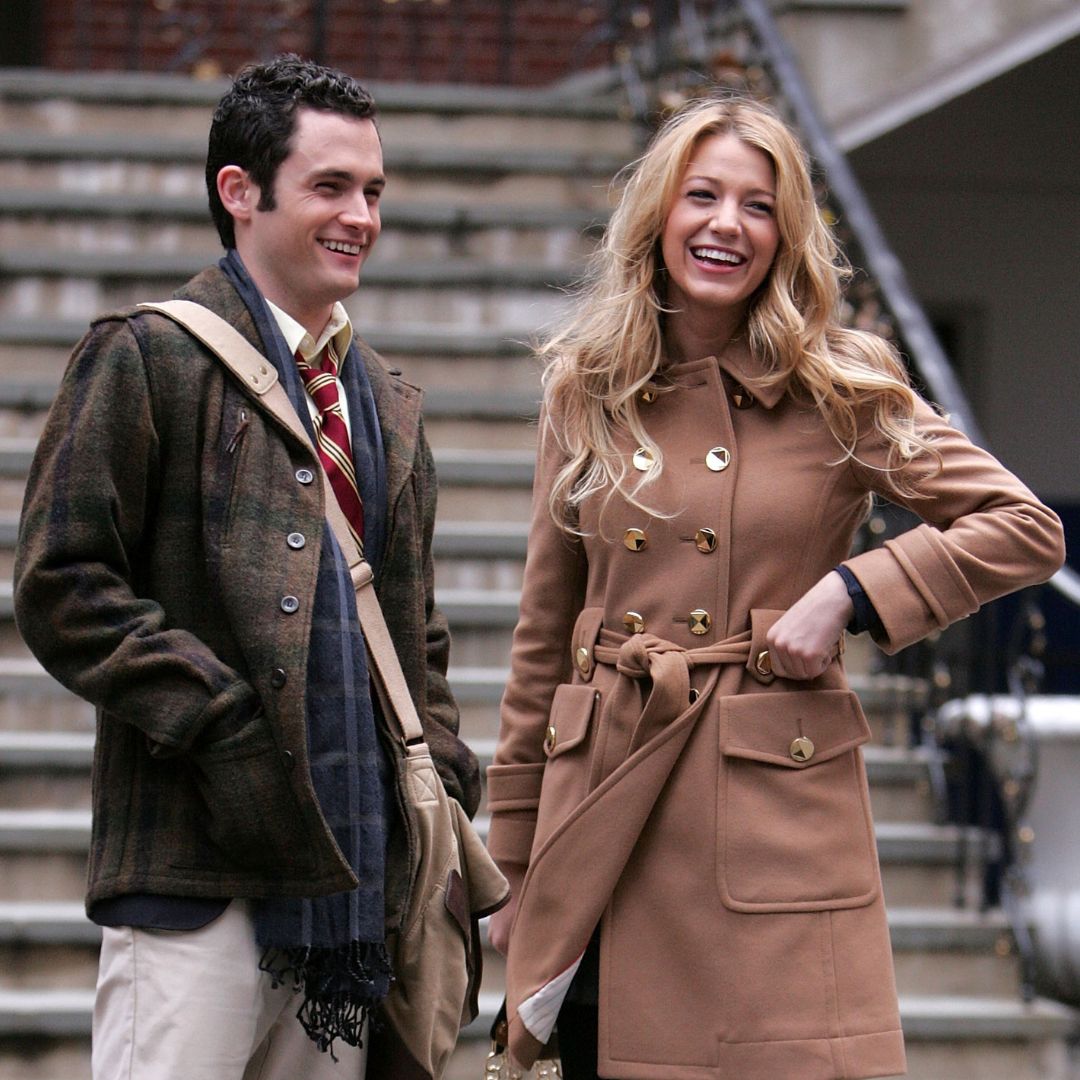 Penn Badgley and Blake Lively kept their breakup a secret from the Gossip Girl cast and crew - here's what we know about their former relationship
Penn Badgley and Blake Lively kept their breakup a secret from the Gossip Girl cast and crew - here's what we know about their former relationshipBy Jenny Proudfoot
-
 Spring has finally sprung - 6 best outdoor workouts that are totally free and boost both body and mind
Spring has finally sprung - 6 best outdoor workouts that are totally free and boost both body and mindSoak in the nature and boost Vitamin D *and* endorphins.
By Anna Bartter
-
 This iconic rose perfume is a compliment magnet—it makes me feel ‘put together’ after just one spritz
This iconic rose perfume is a compliment magnet—it makes me feel ‘put together’ after just one spritzGrown-up and elegant, yet not at all dated.
By Denise Primbet